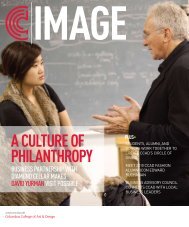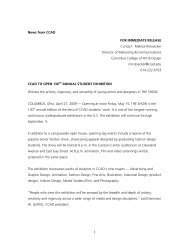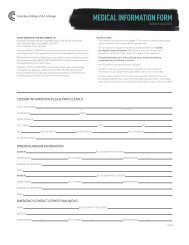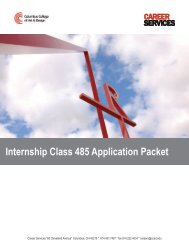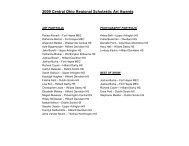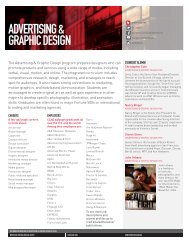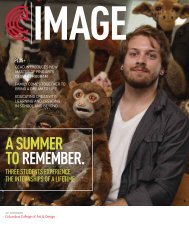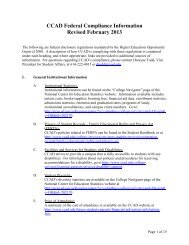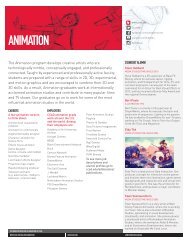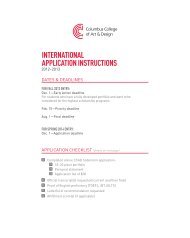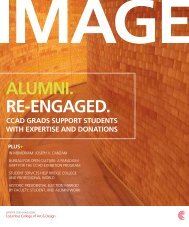STUDENT HANDBOOK - Columbus College of Art & Design
STUDENT HANDBOOK - Columbus College of Art & Design
STUDENT HANDBOOK - Columbus College of Art & Design
You also want an ePaper? Increase the reach of your titles
YUMPU automatically turns print PDFs into web optimized ePapers that Google loves.
ACADEMIC POLICIES AND PROCEDURES 09<br />
situations, credits earned at other schools will be evaluated<br />
and only courses with a “C” or better will be considered for<br />
possible fulfillment <strong>of</strong> requirements at CCAD. Applicants<br />
will be judged on an individual basis with respect to prior<br />
academic experience.<br />
All transfer credit from other institutions must be supported<br />
by <strong>of</strong>ficial transcripts that have the signature <strong>of</strong> the registrar<br />
and the seal <strong>of</strong> the institution. It is the responsibility <strong>of</strong> every<br />
student who has attended other colleges and universities<br />
during summer vacation periods to send <strong>of</strong>ficial transcripts<br />
to the registrar. It is especially important for graduating<br />
seniors to ensure all updated transcripts are received by the<br />
registrar prior to the last term <strong>of</strong> attendance.<br />
A minimum <strong>of</strong> 60 credit hours must be earned at CCAD.<br />
Students may transfer credits earned at another college<br />
equivalent to 60 CCAD credit hours, provided these criteria<br />
are met:<br />
——<br />
Student must complete at least 30 CCAD credit hours <strong>of</strong><br />
studio art/division requirements;<br />
——<br />
In most cases, the senior year must be completed “in<br />
residency,” meaning that the courses must be completed<br />
at CCAD (senior status equals 84.0 credit hours and<br />
above). Under exceptional circumstances, a dean or the<br />
vice president <strong>of</strong> academic affairs may waive certain<br />
residency requirements.<br />
——<br />
Transfer students from colleges with formal articulated<br />
transfer agreements with CCAD should ask their advisor<br />
about customized requirements and policies for their<br />
major.<br />
IDENTIFICATION CARDS<br />
New, full-time Bachelor <strong>of</strong> Fine <strong>Art</strong>s degree-seeking<br />
students receive an identification card prior to the start<br />
<strong>of</strong> their first semester. Returning, full-time BFA students<br />
should retain their existing ID card throughout their time at<br />
CCAD. This card is issued free <strong>of</strong> charge and must be carried<br />
by the student at all times and shown to CCAD employees,<br />
upon request, to verify one’s status as a student. CCAD<br />
identification cards are the property <strong>of</strong> the <strong>College</strong> and, if<br />
requested, must be surrendered to staff upon withdrawal,<br />
dismissal, or graduation from CCAD.<br />
ID cards are used for identification when entering classes,<br />
checking out books from the library, using computer labs,<br />
and entering certain buildings and labs/studios. Additionally,<br />
CCAD students receive free admission to the <strong>Columbus</strong><br />
Museum <strong>of</strong> <strong>Art</strong> and transportation on Central Ohio Transit<br />
Authority (COTA) busses with their ID card.<br />
Replacement ID cards can be obtained for a fee <strong>of</strong> $25 at the<br />
Safety & Security <strong>of</strong>fice.<br />
FIRST DAY OF CLASS<br />
On the first day <strong>of</strong> class, all students may be asked to show a<br />
valid ID card for the current semester. Identification cards are<br />
validated when all tuition and fees are paid or are arranged<br />
to be paid. Students who have a delay <strong>of</strong> service or other hold<br />
with any college <strong>of</strong>fice may not be able to attend class until<br />
the hold is removed. Students with payment problems should<br />
see the One-Stop Student Services staff in the Crane Center.<br />
CREDIT LOAD<br />
Full-time students must register for at least 12 but no more<br />
than 18 credit hours each semester. Students who desire to<br />
enroll for more than 18 credit hours must have permission<br />
from their division dean prior to registration. Without<br />
approval for excess hours, students will be registered in the<br />
courses they list first on their registration worksheets up<br />
to 18 credit hours. Remaining classes will not be entered,<br />
and any subsequent schedule changes will be charged the<br />
standard change <strong>of</strong> schedule fees. The full-time tuition<br />
covers 12-18 credit hours per semester. Any additional,<br />
approved credits will be billed a per-credit charge.<br />
To take more than 18 credit hours, students will need to<br />
follow these steps.<br />
——<br />
Take the completed change <strong>of</strong> schedule form to their<br />
division dean for signature.<br />
——<br />
Return the change <strong>of</strong> schedule form to One-Stop Student<br />
Services staff for processing.<br />
PREREQUISITES<br />
Prerequisite coursework required for certain classes is<br />
checked by computer at the time <strong>of</strong> registration. In addition,<br />
prerequisites are listed on IQ Web. Questions regarding<br />
prerequisites or corequisites should be directed to division<br />
deans or an academic advisor.<br />
CLOSED CLASSES<br />
If a class is closed, students should not approach the<br />
instructor assigned to the class for permission to enter<br />
the class. CCAD policy prohibits individual instructors from<br />
authorizing entry into closed classes. Only the division dean<br />
has the authority to permit entry into closed classes. Division<br />
deans may seek counsel from instructors at their discretion.<br />
Students are not permitted to attend a class in which they are<br />
not <strong>of</strong>ficially enrolled, nor are they permitted to attend a class<br />
that has been closed. Students who attend closed classes,<br />
with or without the instructor’s knowledge, will not receive a<br />
grade or credit and may be referred for disciplinary action.<br />
AUDITING CLASSES<br />
Audited classes are recorded on the student’s permanent<br />
record; however, no college credit is earned for audits.<br />
Students occasionally choose to audit a class in order to



